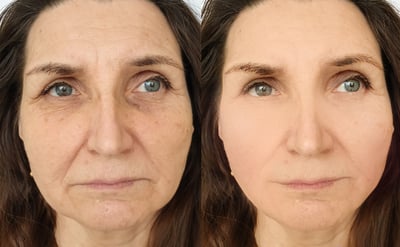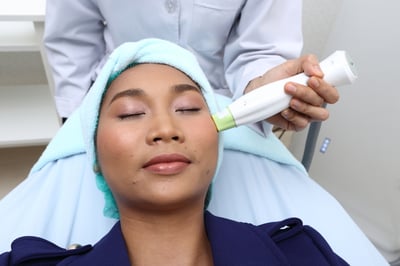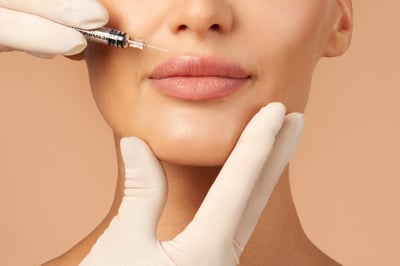
With hundreds of cleansers, serums, and creams on the market, you’d think it would be easy to achieve gorgeous, glowing skin. But many consumers find themselves frustrated when their face or skin doesn’t improve as a product label promised, or they find themselves with skin that looks even worse than before. What’s interesting is that the top reasons why skin products fail may have nothing to do with the products themselves, but rather how they’re being used, or the skin type of who’s using them.
If you’re struggling with skincare that’s not working, it’s likely one of the following reasons.
5 Skincare Mistakes That Lead to Product Failure
1. You’re using the wrong products for your skin type
Did your friend recommend a product that cleared up their acne? If you tried it and it’s not working for you, that’s normal. What causes acne can vary from person to person, and your skin type may be very different from theirs. Products that help oily skin, for example, often won’t work for dry or sensitive skin. Without an accurate skin-type diagnosis, it can be frustrating to find a routine that truly works. A dermatologist can guide you to the right ingredients to look for(or avoid)so your skincare plan matches your skin’s needs.
If you have oily skin, you may need to:
Use a salicylic acid (BHA) cleanser to penetrate oily pores, and for moisturizing, use a light formula rather than a heavy cream that will clog pores. And while benzoyl peroxide or a retinoid cleanser may be enough to clear up minor breakouts, severe acne may require an oral treatment such as isotretinoin to combat sebum over-production from the inside.
If you have dry skin, you may need to:
Use hyaluronic acid or ceramide cleansers that lock in moisture, and avoid cleansers with alkaline or alcohols that cause dryness. It’s also best to stay away from exfoliating serums, and use cream moisturizers with emollients and ceramides that hydrate the skin.
If you have sensitive skin, you may need to:
Use gentle cleansers free of fragrance and dyes to avoid irritation. Glycerine, niacinamide, and hyaluronic acid are sometimes great for soothing and repairing the skin barrier, but they should be introduced one at a time to determine if they cause irritation.
Long story short? What’s good for a friend might not be what’s good for you, which is why a dermatologist should provide a personalized skin care routine based on your individual needs.
2. You’re using products in the wrong order, or inconsistently
Your skin care products should be layered from thinnest to thickest, or lightest to heaviest. If you slather on a thick moisturizing cream before putting on an anti-aging serum, the serum won’t be able to penetrate your skin, and thus won’t stimulate collagen production as promised. Skipping steps, changing products too often, or not using them as directed can ruin results, so stick to the same routine day after day. It generally takes 4 to 12 weeks to see a change, so stay consistent and you’re likely to see a difference.
Each morning, you should follow a skincare routine in this order:
Cleanser. Think of cleansing as creating a fresh palate. It removes dirt, excess oil, and makeup residue so they don’t clog your pores, allowing the following products to penetrate your skin. Simply wash and rinse before beginning the next step.
Serum. The serum you use will depend on your skin type and goals. For instance, hyaluronic acid serums add hydration to the skin, while vitamin C serums can help restore elasticity. Apply 4 to 5 drops onto your hand and press it into your skin, then wait about a minute for it to settle in.
Medication (if needed). Any topical prescription lotions or creams, such as tretinoin for acne or corticosteroid cream for eczema, should be applied after serums.
Moisturizer. Moisturizers enhance the skin’s water-holding capacity to prevent dryness. They are also beneficial for the treatment of skin diseases with reduced skin barrier function such as atopic and contact dermatitis, psoriasis, and rosacea.
Sunscreen. A broad-spectrum SPF 30+ sunscreen protects against harmful UV rays and prevents premature aging. Dermatologists have long thought that applying other products on top of SPF can disrupt the protective film it creates and make it less effective against UV rays. However, recent research suggests that applying moisturizer over sunscreen doesn’t alter its effectiveness. It’s best to speak with your dermatologist regarding the best order for your skin concerns.
At night, a good rule of thumb is to clean, treat, and hydrate. After removing makeup, use a cleanser, apply retinol or serums, then moisturize before going to sleep.
3. Using products that don’t work well together
“The more the merrier” is an all too common skincare mistake. When certain products are layered together, they can actually neutralize each other’s active ingredients. If you’re seeing disappointing results in your skin, it could be because you’re combining:
Retinoids + Benzoyl Peroxide. Both of these exfoliate the skin and prevent clogged pores, which makes them each great for treating and preventing acne. But when used together, benzoyl peroxide can oxidize the retinol molecule, making it less effective. Dermatologists have found that when applied separately – using a low-dose benzoyl peroxide treatment in the morning and a cosmetic retinol product at night – patients start to see fewer blemishes.
Retinoids + Salicylic Acid. If you’re using a salicylic acid facial wash to treat acne, along with retinoids to reduce the appearance of fine lines and wrinkles, you’re likely noticing dry skin. Not only can dry skin be irritating, but to compensate for being overly dry, oil production ramps up — leading to more acne. It’s best to use salicylic acid only in the morning and apply the retinoid treatment at night to get the full benefits of both.
Vitamin C + Benzoyl Peroxide. Vitamin C is a great addition to your anti-aging regimen because it offers protection from air contaminants and UV radiation. However, it is an antioxidant while Benzoyl peroxide is an oxidizer, which means they cancel each other out when layered. Apply vitamin C in the morning and benzoyl ointment at night to see fewer fine lines and a clearer complexion.
4. Forgetting that skin changes with the seasons
Is your skincare not working just as summer heats up, or as winter sets in? It could have to do with the weather. Dr. J. Mark Jackson, Forefront physician and Clinical Professor of Dermatology at the University of Louisville, says dry air may be why skin products fail in colder months.
“Some things don’t change seasonally, like the daily use of sunscreen,” says Dr. Jackson. “However, winter typically brings dryer air, so your routine will emphasize keeping your skin hydrated and reducing further drying. If you usually use lotions with retinol or alpha hydroxy—which can be drying—they may end up irritating or worsening dry skin during the winter months.”
Likewise, if you’ve been using a heavier moisturizing cream throughout winter, you’ll want to switch to lightweight products that won’t clog pores as oil production ramps up in summer.
5. Ignoring life changes
No matter how great your skincare products are, it’s normal to see changes in your skin when normal life is out of whack. Skincare issues can pop up due to:
Stress. Research at the University of Utah shows that when stressed, the brain secretes hormones that induce the release of cortisol (a stress hormone) from the adrenal glands. When skin senses this hormone, inflammation increases and so does the production of oil and sebum, exacerbating acne, eczema, psoriasis or rosacea. Taking measures to reduce stress can improve skin health, so consider cutting back hours at work, exercising, or seeing a therapist to vent.
Pregnancy, period, or perimenopause. A woman’s skin changes rapidly in different times of the month and throughout life. It can dry out during pregnancy, become oily during menstruation, and begin to sag and wrinkle as estrogen production declines. A dermatologist can recommend products that may be able to address these concerns.
Sleep disruptions. While we sleep, the skin repairs itself and fresh new skin cells are produced. Collagen and elastin are rebuilt, leading to tighter, firmer skin. And blood flow increases, leading to a more radiant complexion. If you’re not sleeping long enough at night due to insomnia, sleep apnea, or another sleep disorder, it may be time to see a sleep specialist to get your health – and your skin’s health – back on track.
Bonus: 6. Guessing which products are best instead of asking an expert
There are so many skincare products out there, it’s nearly impossible to know which ones are worth the money. Instead of using a product your friend recommends, or standing in front of a wall of options at Target or Sephora, it’s worth it to consult with a professional. Over-the-counter products do work for some people, but our dermatologists can explain why medical-grade ingredients may be best for your skin condition.
An accurate skin type diagnosis and professional product recommendation are essential to your skincare’s success, so contact a Forefront office near you to schedule an appointment today.





